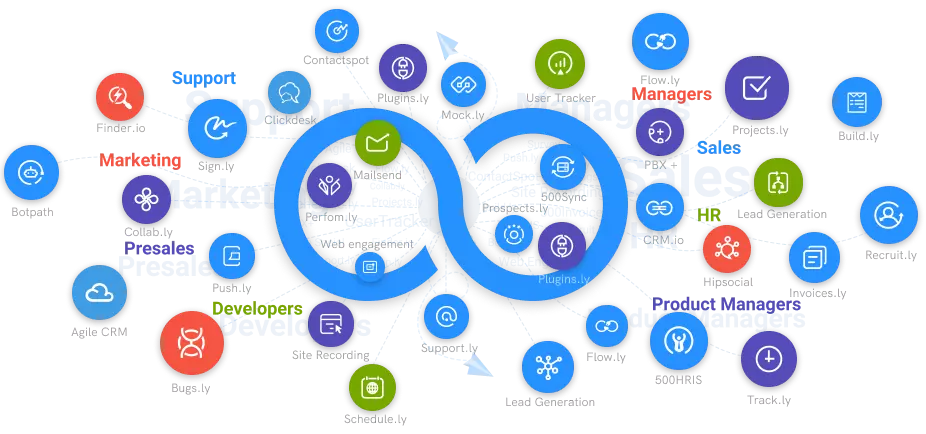What are the differences between RPA and cognitive intelligence?
RPA and Cognitive intelligence are automation that increase your productivity in the short and long run. Here are some differences between the two.
#1
Automated Repetitive Tasks
#2
End-to-End Bot Development
#3
Customized Bot Builder
#4
Unlimited Automated Workflows Management
#5
Automated Data Extraction
#6
Workflows Recording Management
#7
Rule-based Process Automation
#8
Seamless Data Management
#9
Unbelievable pricing - the lowest you will ever find
#10
Everything your business needs - 50 apps, 24/5 support and 99.95% uptime
Organizations have been contemplating using automation technologies for a long time, with many thinking they can do just right without them.
Unfortunately, things have changed, and businesses worldwide are looking for automation for clerical and administrative tasks. RPA enables organizations to drive results more quickly, accurately, and tirelessly than humans. They are ultimately increasing the production of the organization.
RPA- Robotic Process Automation
RPA is a software technology used to easily build, deploy, and manage software robots to imitate human actions in interactions with digital systems and software. They are used to handle repetitive and rule-based digital tasks. The tasks RPAs handle include information filling in multiple places, data reentering, copying, and pasting.
RPA enables organizations to hand over works with routine processes to machines—that are capable—so humans can focus on more dynamic tasks. With Robotic Process Automation, business corporations efficiently manage costs by streamlining the process and achieving accuracy. Also, humans can now focus on tasks that require judgment, creativity and interactional skills.
Human errors are eliminated when businesses use intelligent RPA. Nowadays, consumers demand a more efficient and personalized service, and only businesses with robotic process automation can meet their demand. With more customer demand and an error-free level of expectancy, RPA will remain more relevant in the long run.
RPA is precise, accurate, and immune to boredom and weariness. Also, it can handle more work than the human workforce. However, RPA can only handle repetitive works and interact with a software application or website.
Cognitive Intelligence
Cognitive intelligence—in humans—refers to human's mental ability and understanding developed through thinking, experiences, and senses. It is the capability to create knowledge from experience or existing information. Cognitive intelligence also includes other intellectual functions like learning, memory, judgment, reasoning, and attention. The human brain can take and digest information, form intelligence and understanding. This is why organizations measure cognitive intelligence through tests and aptitudes
The advent of technology teaches machine-human behaviors called cognitive intelligence in AI. The intelligence covers the technology that enables apps, websites, bots, etc., to see, speak, hear, and understand users' needs through natural language. This is the aspect of cognitive intelligence that will be discussed in this article from now on.
Cognitive Intelligence aims to imitate rational human activities by analyzing a large amount of data generated by connected systems. These systems use predictive, diagnostic, and analytical software to observe, learn, and offer insights and automatic actions.
With the advent of cognitive intelligence, AI aims to adapt the technology so humans can interact with it naturally and daily. They aim to develop a machine that can listen and speak, understand grammatical context, understand emotion and feelings and recognize images.
9 Differences Between RPA and Cognitive Intelligence
However, to fully understand the benefits from their automated activities, organizations need to understand the difference between RPA and cognitive intelligence
- Differences in application: *As stated by Anthony Edwards, "People are trying to apply RPA before they know how their processes work. That tends to fail as they are constantly discovering new exceptions and variants."
Robotic process automation is used to imitate human tasks with more precision and accuracy by using software robots. RPA is effective for tasks that do not require thinking, decision making, and human intervention. There will always be a need for human intervention to make decisions like processes you do not fully understand in an organizational setting. In cases like this, RPA can come unstuck.
Alternatively, cognitive intelligence thinks and behaves like humans, which is more complex than the repetitive actions mimicked by RPA automation. Cognitive intelligence can handle tasks the way a human will by analyzing situations the way a human would.
In a hospital setting, RPA can count the number of patients in a ward or with a particular diagnosis. While cognitive analysis can diagnose ailments, prescribe medications and monitor the health of patients.
- Differences in technology: RPA is designed by using essential technologies like screen scraping, macro script and workflow automation. The most straightforward RPA bots can be created by registering the clicks and keystrokes of users as they interact with an app. In times of problems, a user can watch the bot connect with the app and identify the steps that need to be refined.
Robotic process automation does not require automation, and it depends more on the configuration and deployment of frameworks. The technology of intelligent RPA is good at following instructions, but it's not good at learning on its own or responding to unexpected events.
On the other hand, cognitive intelligence uses machine learning and requires the panoptic use of the programming language. It uses more advanced technologies such as natural language processing (NLP), text analysis, data mining, semantic technology and machine learning. It uses these technologies to make work easier for the human workforce and to make informed business decisions.
Also, cognitive intelligence's level of technology helps it learn on the job. If it meets an unexpected scenario, the AI can either resolve it or file it out for human intervention, and an RPA robot would have broken down.
- Differences in the method of automation: "RPA is a technology that takes the robot out of the human, whereas cognitive automation is the putting of the human in the robot." Wayne Butterfield
RPA bots work on a rule-based data input structure. It is a process-oriented technology that is used to work on ordinary tasks that are time-consuming. Robotic process automation is effective for simple day-to-day tasks.
Cognitive technology utilizes a knowledge base to handle complex tasks. It studies human behavior and uses it to act like them. The technology examines human-like conversations and behaviors and uses it to understand how humans behave. Subsequently, the program defines its own rules.
- Differences in the data processing: An RPA is like a data operator who enters structured data into a system. RPA works with standardized data and can only process the data in a structured or semi-structured format. The robot will likely become unstuck or break down when it is fed with unstructured data.
Cognitive intelligence is like a data scientist who draws inferences from various types and sets of data. It presents the data in a consumable format to management to make informed decisions.
If cognitive intelligence is fed with unstructured data, the system finds the relationships and similarities between the items by learning from the association.
For example, organization XYZ has thousands of unstructured checks and orders in their database, and cognitive automation tools will analyze and group the items by asking questions like
Have I seen this quality before? Has it been used earlier How was it used Is there any connection between this and the earlier tool and so on The tool can make sense of the data and process it with little or no human intervention or supervision by asking these questions.
- Differences in benefits: "RPA provides immediate ROI, whereas cognitive automation often take more time as it involves learning the human behaviors and language to interpret and automate the data" – Deven Samant
The effect of rpa on a business is immediate. Robotic process automation guarantees an immediate return on investment. Since intelligent RPA performs tasks more accurately than humans and is involved in day-to-day tasks, organizations immediately experience their effect on production.
Cognitive automation can only effectively handle complex tasks when it has studied the behavior of humans. This takes time, and the effect won't be felt in the short term.
However, in the long run, Cognitive intelligence produces the most effective for organizations than RPAs.
- The difference in tactical and strategic reach: Both RPA and cognitive intelligence use process automation as their foundational premise, deciding which tasks humans execute are now being handled by digital robots. Even so, cognitive automation expands the functional boundaries of what is automated beyond the reach of RPA's capabilities.
Cognitive intelligence is dynamic and progressive and can extend the nature of the data it can interpret. Also, it can expand the complexity of its decisions compared to RPA with the use of OCR (Optical character recognition), computer vision, virtual agents and natural language processing.
The use of RDA is centered on the manual activities of processes and is mainly used to increase the degree of process efficiency and also to reduce routine manual processing. RPA is quite proficient at this, and its usage cuts across all domains in a business to increase values significantly. However, it is primarily incapable of implementing transformational change in its value to chains because it is task-focused
- Differences in straight-through processing and exceptions: RPA is best for straight-through processing tasks that follow a predefined logic. In contrast, cognitive intelligence is adept at automating more complex tasks. Cognitive automation does not require strict rules to perform.
"Cognitive RPA is adept at handling exceptions without human intervention. A human traditionally had to make the decision or execute the request, but now the software is mimicking the human decision-making activity."- Jon Knisley.
For example, a cognitive intelligence system can use AI capabilities like OCR to read documents by capturing text from documents and using natural language processing to understand the users, like biodata, invoice items, and terms. The system further organizes them into appropriate fields in a procurement and payment workflow.
- Differences in Scalability "Comparing RPA vs cognitive automation is like comparing a human to a machine in the way they learn a task a and execute them" Tony Winter
RPA robots are taught to perform specific tasks by following basic rules that are blindly executed for as long as the surrounding environment is unchanged.
Conversely, cognitive intelligence understands the intent of a situation by using the senses available to it to execute tasks in a way humans would. It then uses this knowledge to make predictions and credible choices, thus allowing for a more resilient and adaptable system.
RPA is rigid and unyielding, cognitive automation is dynamic, blends to change, and progressive.
- Differences in continuum "RPA is a great way to start automating processes, and cognitive automation is a continuum of that"- Manoj Karanth
RPA has helped organizations reduce back-office costs and increase productivity by performing daily repetitive tasks with greater precisions. Tasks can be automated with intelligent RPA; cognitive intelligence is needed for tasks that require context, judgment, and an ability to learn.
With cognitive intelligence, you move automation to the next level by technically processing the end products of RPA tasks.
Summary
As an organization that looks to embrace the world of automation, both RPA and Cognitive intelligence bring a lot to the table. You can use RPA to perform mundane, repetitive tasks, while cognitive automation simulates the human thought process to discover, learn and make predictions.
If you want a system that performs a simple daily task, intelligent RPA is your man with preset rules. However, if you want a complex system that can handle unstructured data and requires accurate decisions, you should use cognitive intelligence.
You can also use both to automate your day-to-day tasks and enable automated business decision-making.
Botpath is an RPA software that increases efficiency and reduces risks by configuring bots to execute tasks accurately and timely. The software is an AI-driven RPA that gives you immediate ROI for your business. It is easy to use and automate your business cases in a single go.





